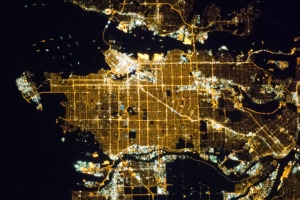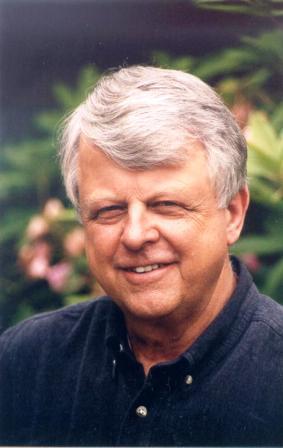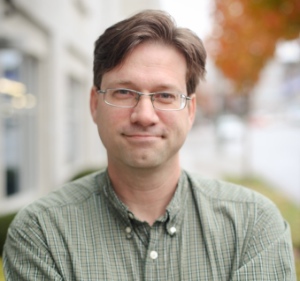
Jeff Greenman (left), president of Regent College, and Brett Salkeld, archdiocesan theologian of the Archdiocese of Regina, will lead a conversation on how Evangelicals and Catholics can work together, March 1 at Coastal Church.
The Vancouver Consultation is a year-long process to engage the diversity of the church in a kind of “spiritual census” of the city – discovering what God is doing around town; documenting best practices and innovative forms of mission; and discerning the Holy Spirit’s invitation to cooperate with God, each other and people of good will for the shalom of the city (Jeremiah 29:7). Flyn Ritchie and I are co-facilitating the Consultation, with oversight from a core team of senior clergy, non-profit and marketplace leaders.
Good theology begins with an inductive, comprehensive reading of scripture: explore the meaning of specific words in the original languages (among other contextual elements and angles of perspective), then scale up to passages, books and the full sweep of the biblical story. Similarly, good urban missiology starts with an inductive, comprehensive reading of your city.
Consequently, we launched the Consultation in mid-January by dividing the city of Vancouver into nine zones based on neighbourhood boundaries and demographics, conducting a focus group of pastors and non-profit leaders in each.
Signs of hope and challenge in the city
 Over the past six weeks, 137 people from 103 ministries participated in the focus groups. This represents 25 percent of the ministries we have been able to identify in the city, and includes folk from the Evangelical, Pentecostal/Independent, Roman Catholic, Eastern Orthodox and Mainline streams of the church.
Over the past six weeks, 137 people from 103 ministries participated in the focus groups. This represents 25 percent of the ministries we have been able to identify in the city, and includes folk from the Evangelical, Pentecostal/Independent, Roman Catholic, Eastern Orthodox and Mainline streams of the church.
We asked each participant to describe the greatest sign of God’s activity in their neighbourhood as well as the primary spiritual and social challenges facing their neighbours and parishioners. Next month, we will release transcriptions from each group, along with an executive summary. Clear, convergent themes emerged that were surprisingly consistent across the various parts of town. Stay tuned . . .
Up next: Catholic-Evangelical Conversation
Why Unity Matters from ACT3 Network on Vimeo.
Vancouver theologian J.I. Packer was one of the principal framers of the famous 1994 ecumenical document, Evangelicals and Catholic Together, which tried to outline why and how Protestants and Catholics can “explore patterns of working and witnessing together in order to advance the one mission of Christ” as a “necessary consequence of the faith that we affirm together.”
That document was quite controversial, and both Protestant and Catholic signatories made it plain that significant theological differences remain as impediments to full communion. Nevertheless, it marked a milestone in a journey that continues, sometimes publicly and institutionally – such as the numerous fruitful meetings between the last two popes and Geoff Tunnicliffe, longtime resident of Delta and (now former) head of the World Evangelical Alliance – but more often quietly and personally as the Holy Spirit helps Christians to find inspiration and insight in each other’s tradition.
From monastic spiritual disciplines to the Alpha Course, from a sacramental view of the cosmos to charismatic worship, from Catholic teaching on social justice to Protestant “missional” parish renewal – we are learning the joy of following Jesus together in a culture increasingly antagonistic toward religion in general and toward Christianity in particular.
In light of this, two events next week will create space for Protestants and Catholics to
- correct some misperceptions about our respective theology and practices
- discover more about the riches each tradition offers for sustaining our faith in secular society and expressing God’s love to a hurting world
- see how relational partnerships can have long-term city/global impact.
Sunday Sermons
with Dr. Ray Bakke
Coastal Church, 1160 West Georgia Street, Vancouver
February 28, 9:30 am, 11 am, 12:30 pm
A Catholic-Evangelical Conversation: Seeking Unity in Our Common Faith in Christ
with Dr. Jeff Greenman, Dr. Brett Salkeld and Dr. Ray Bakke
Coastal Church, 1160 West Georgia St, Vancouver
Tuesday, March 1, 7 – 9 pm free, but please rsvp
This is a free public panel discussion, with audience participation, for people who wonder if it is possible to bridge the Evangelical – Catholic divide and are curious about what difference that could make for their life of faith and for the mission of Jesus in Metro Vancouver.
Jeff Greenman is president and professor of theology and ethics at Regent College. Prior to coming to Regent he held senior administrative and teaching positions at Wheaton College and Tyndale Seminary. Before taking up these leadership roles in theological education, Greenman worked in the US government in the areas of education and juvenile justice, as well as working in national politics and in educational consulting. Greenman will be standing in for the previously announced John Armstrong of ACT3 Network, who is recovering from illness.
Brett Salkeld is archdiocesan theologian for the Roman Catholic Archdiocese of Regina, where he is responsible for diaconate formation. His published work includes the book Can Catholics and Evangelicals Agree About Purgatory and the Last Judgment? and he serves as book reviews editor for Pro Ecclesia: A Journal of Catholic and Evangelical Theology. Salkeld also serves the Canadian Conference of Catholic Bishops on the Canadian national Roman Catholic – Evangelical Dialogue.
Ray Bakke is widely regarded as the godfather of evangelical urban missiology. Raised near Mount Baker by Swedish Baptist farmers and loggers, he assisted Billy Graham and World Vision throughout the 1970s to understand the myriad dynamics of global urbanism, bringing biblical theology and sociological method together into a conceptual framework and consultative process that unites the strengths of what Graham liked to call the five streams of the church: Catholic, Orthodox, Evangelical, Pentecostal/Independent and Conciliar (World Council of Churches). In 1979 Bakke was asked by the Lausanne Committee for World Evangelization to become their first Senior Associate for Large Cities. Now in semi-retirement outside Bellingham, Bakke believes Vancouver is an ideal laboratory for 21st century urban mission.
Later attractions
The Consultation proceeds through the spring and summer along four tracks.
First, we are convening roundtables for pastors and non-profit executives to engage with leaders of other institutional sectors such as City Hall, the Health Authority, School Board, etc. The aim here is to see the city as it is now through their eyes, to probe their vision of an ideal Vancouver, and to have them identify a few seemingly impossible things their sector needs to get done in the next two years so that we as faith leaders can be praying for them and considering how our constituencies may be able to help.
Second, we are organizing workshops to give clergy and laity practical tools for further exploring their neighbourhood contexts and experimenting with holistic mission.
Third, based in part on the signs of hope identified through the focus groups, we will work with 8 – 12 practitioners to craft case studies of their particularly noteworthy and timely examples of local mission.
Fourth, we’re encouraging as many Christian leaders (this means you) as possible to submit brief field notes on what they’re observing and learning as they try to live the gospel out in their ministries, workplaces and neighbourhoods – even brilliant mistakes or unresolved questions are valuable to share.
Then on November 24 – 25 we will hold a City Summit to summarize what we’ve seen and heard so far, to present an “exegesis” of Vancouver for peer review, so to speak. This will involve plenary speakers, case studies fashioned into TED-style presentations, site tours and – crucially – group sessions to answer the ultimate question of the Consultation.
In light of where we’ve collectively seen God on the move in our city, in the face of the spiritual and social challenges we’ve identified together, how is the Holy Spirit prompting us to encourage one another, to learn from each other, and to cooperate more with each other as well as with people of good will so that we become catalysts for peace and wellbeing?
Please consider contributing your time, talent and/or treasure to this initiative. Go here for more information.
Jonathan Bird is executive director of City Gate Leadership Forum, which “exists to help organizations and change-makers move from good intentions to effective outcomes as they seek the well-being of the people and places of Greater Vancouver.”



This is exciting. That we may love one another so the world will see and believe.
“I pray that they will all be one, just as you and I are one–as you are in me, Father, and I am in you. And may they be in us so that the world will believe you sent me.” John 17:21